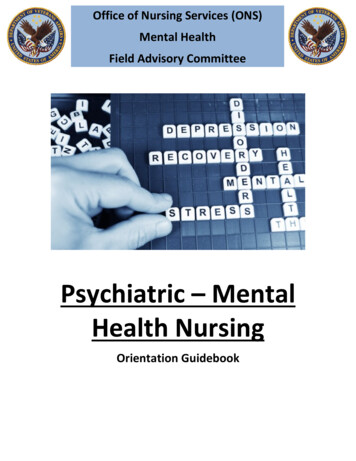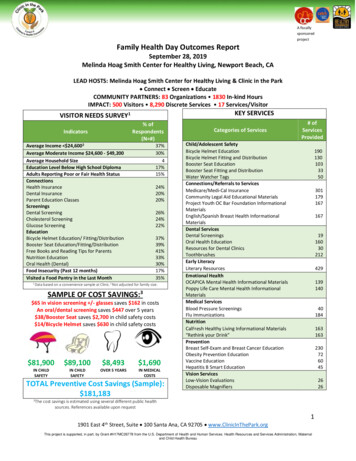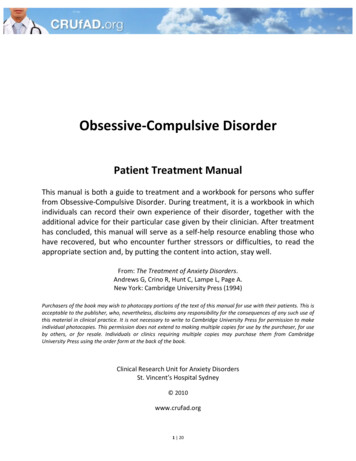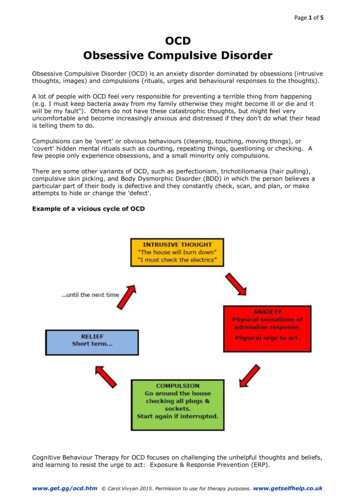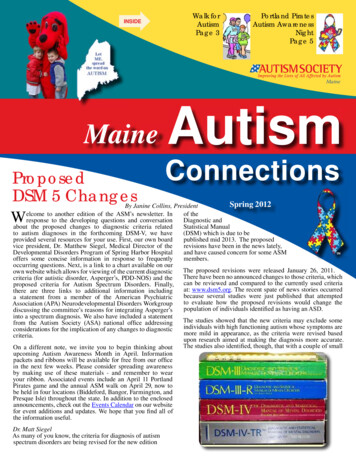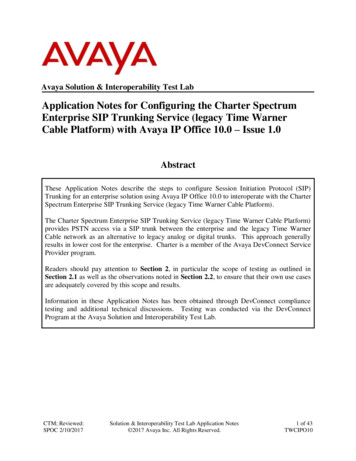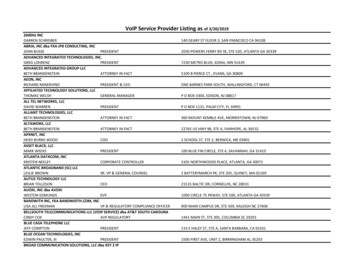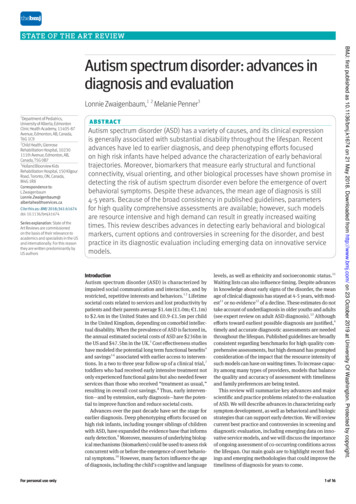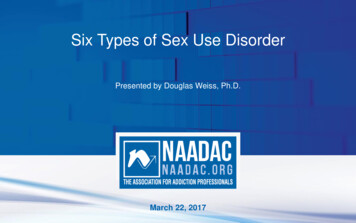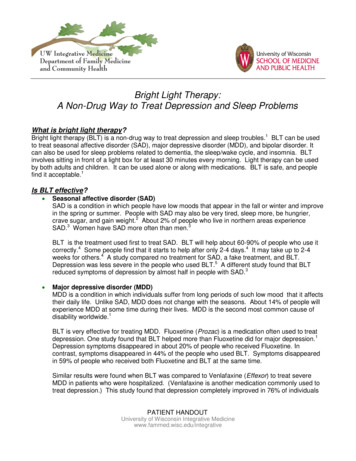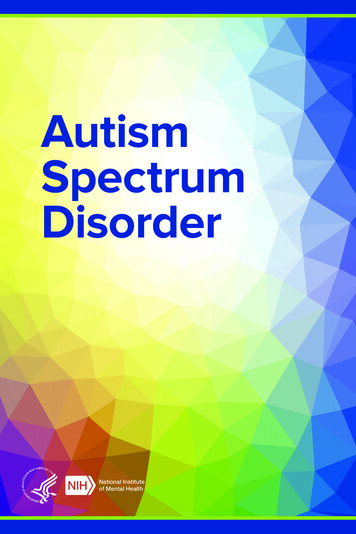
Transcription
AutismSpectrumDisorderNational Instituteof Mental Health
What is autism spectrum disorder?Autism spectrum disorder (ASD) is a developmental disorder that affects communication andbehavior. Although autism can be diagnosed at any age, it is described as a “developmentaldisorder” because symptoms generally appear in the first two years of life.According to the Diagnostic and Statistical Manual of Mental Disorders (DSM-5), a guidecreated by the American Psychiatric Association used to diagnose mental disorders,people with ASD have: Difficulty with communication and interaction with other people Restricted interests and repetitive behaviors Symptoms that affect the person’s ability to function in school, work, and otherareas of lifeAutism is known as a “spectrum” disorder because there is wide variation in the typeand severity of symptoms people experience.ASD occurs in all ethnic, racial, and economic groups. Although ASD can be a lifelongdisorder, treatments and services can improve a person’s symptoms and ability to function.The American Academy of Pediatrics recommends that all children be screened forautism. All caregivers should talk to their child’s doctor about ASD screening or evaluation.What are the signs and symptoms of ASD?People with ASD have difficulty with social communication and interaction and haverestricted interests and repetitive behaviors. The list below gives some examples of thetypes of behaviors that are common in people diagnosed with ASD. Not all people withASD will have all behaviors, but most will have several of the behaviors listed below.Social communication/interaction behaviors may include: Making little or inconsistent eye contact Having a tendency not to look at or listen to people Rarely sharing enjoyment of objects or activities by pointing at or showing thingsto others Failing to, or being slow to, respond to someone calling their name or to otherverbal attempts to gain attention Having difficulties with the back and forth of conversation Often talking at length about a favorite subject without noticing that others are notinterested or without giving others a chance to respond Having facial expressions, movements, and gestures that do not match what isbeing said Having an unusual tone of voice that may sound sing-song or flat and robot-like Having trouble understanding another person’s point of view or being unable topredict or understand other people’s actionsRestrictive/repetitive behaviors may include: Repeating certain behaviors or having unusual behaviors, such as repeating wordsor phrases (a behavior called echolalia)
Having a lasting intense interest in certain topics, such as numbers, details, or factsHaving overly focused interests, such as with moving objects or with parts of objectsGetting upset by slight changes in a routineBeing more sensitive or less sensitive than other people to sensory input, such aslight, noise, clothing, or temperaturePeople with ASD may also experience sleep problems and irritability. Although peoplewith ASD experience many challenges, they may also have many strengths, including: Being able to learn things in detail and remember information for long periods of time Being strong visual and auditory learners Excelling in math, science, music, or artWhat are the causes and risk factors for ASD?Researchers don’t know the exact causes of ASD, but studies suggest that genes can acttogether with influences from the environment to affect development in ways that lead toASD. Although scientists are still trying to understand why some people develop ASDand others don’t, some factors that increase the risk of developing ASD include: Having a sibling with ASD Having older parents Having certain genetic conditions (For example, people with conditions such asDown syndrome, fragile X syndrome, and Rett syndrome are more likely than othersto have ASD.) Being born with a very low birth weightNot everyone who has these risk factors develops ASD.How is ASD diagnosed?Doctors diagnose ASD by looking at a person’s behavior and development. ASD canusually be reliably diagnosed by the age of two. It is important for those with concerns toseek out an assessment as soon as possible so that a diagnosis can be made, andtreatment can begin.Diagnosis in Young ChildrenDiagnosis in young children is often a two-stage process.Stage 1: General Developmental Screening During Well-Child CheckupsEvery child should receive well-child checkups with a pediatrician or an early childhood healthcare provider. The American Academy of Pediatrics recommends that all children bescreened for developmental delays at their 9-, 18-, and 24- or 30-month well-child visits, andspecifically for autism at their 18- and 24-month well-child visits. Additional screenings mightbe needed if a child is at high risk for ASD or developmental problems. Children at highrisk include those who have a family member with ASD, have some ASD behaviors, haveolder parents, have certain genetic conditions, or who were born at a very low birth weight.
Parents’ experiences and concerns are very important in the screening process for youngchildren. Sometimes the doctor will ask parents questions about their child’s behaviors andcombine those answers with information from ASD screening tools and with his or herobservations of the child. To read more about ASD screening tools, visit the Centers forDisease Control and Prevention’s (CDC) website at ren who show developmental differences during this screening process will bereferred for a second stage of evaluation.Stage 2: Additional EvaluationThis second evaluation is with a team of doctors and other health professionals who areexperienced in diagnosing ASD.This team may include: A developmental pediatrician—a doctor who has special training in child development A child psychologist and/or child psychiatrist—a doctor who has specialized trainingin brain development and behavior A neuropsychologist—a doctor who focuses on evaluating, diagnosing, and treatingneurological, medical, and neurodevelopmental disorders A speech-language pathologist—a health professional who has special training incommunication difficultiesThis second evaluation may assess: Cognitive level or thinking skills Language abilities Age-appropriate skills needed to complete daily activities independently, such aseating, dressing, and toiletingBecause ASD is a complex disorder that sometimes occurs along with other illnesses orlearning disorders, the comprehensive evaluation may include blood tests and a hearing test.The outcome of this evaluation will result in a formal diagnosis and recommendationsfor treatment.Diagnosis in Older Children and AdolescentsASD symptoms in older children and adolescents who attend school are often first recognizedby parents and teachers and then evaluated by the school’s special education team. Theschool’s team may perform an initial evaluation and then recommend these children visittheir primary health care doctor or a doctor who specializes in ASD for additional testing.Parents may talk with these doctors about their child’s social difficulties, including problemswith subtle communication. These subtle communication issues may include problemsunderstanding tone of voice, facial expressions, or body language. Older children andadolescents may have trouble understanding figures of speech, humor, or sarcasm. Parentsmay also find that their child has trouble forming friendships with peers.
Diagnosis in AdultsDiagnosing ASD in adults is often more difficult than diagnosing ASD in children. In adults,some ASD symptoms can overlap with symptoms of other mental health disorders, suchas anxiety disorder or attention-deficit/hyperactivity disorder (ADHD).Adults who notice signs and symptoms of ASD should talk with a doctor and ask for areferral for an ASD evaluation. Although testing for ASD in adults is still being refined,adults can be referred to a neuropsychologist, psychologist, or psychiatrist who hasexperience with ASD. The expert will ask about: Social interaction and Repetitive behaviorscommunication challenges Restricted interests Sensory issuesInformation about the adult’s developmental history will help in making an accuratediagnosis, so an ASD evaluation may include talking with parents or other family members.Getting a correct diagnosis of ASD as an adult can help a person understand past challenges,identify his or her strengths, and obtain the right kind of help. Studies are now under wayto determine the types of services and supports that are most helpful for improving thefunctioning and community integration of transition-age youth and adults with ASD.What are treatments for ASD?Treatment for ASD should begin as soon as possible after diagnosis. Early treatment forASD is important because proper care can reduce individuals’ difficulties while helpingthem learn new skills and make the most of their strengths.The wide range of issues facing people with ASD means that there is no single besttreatment for ASD. Working closely with a doctor or health care professional is animportant part of finding the right treatment program.MedicationA doctor may use medication to treat some symptoms that are common with ASD. Withmedication, a person with ASD may have fewer problems with: Irritability Hyperactivity Aggression Attention problems Repetitive behavior Anxiety and depressionRead more about the latest news and information on medication warnings, patientmedication guides, or newly approved medications at the Food and Drug Administration’swebsite at www.fda.gov.Behavioral, Psychological, and Educational TherapyPeople with ASD may be referred to doctors who specialize in providing behavioral,psychological, educational, or skill-building interventions. These programs are typicallyhighly structured and intensive and may involve parents, siblings, and other family members.These programs may help people with ASD:
Learn life skills necessary to live independently.Reduce challenging behaviors.Increase or build upon strengths.Learn social, communication, and language skills.Other ResourcesThere are many social services programs and other resources that can help people withASD. Here are some tips for finding these additional services: Contact your doctor, local health department, school, or autism advocacy group tolearn about special programs or local resources. Find an autism support group. Sharing information and experiences can helpindividuals with ASD and/or their caregivers learn about treatment options andASD-related programs. Record conversations and meetings with health care providers and teachers. Thisinformation helps when it’s time to make decisions about which programs might bestmeet an individual’s needs. Keep copies of doctors’ reports and evaluations. This information may help anindividual qualify for special programs.Where can I find resources about ASD?For more information about ASD, visit: Eunice Kennedy Shriver National Institute of Child Health and Human Developmentwww.nichd.nih.gov National Institute of Neurological Disorders and Strokewww.ninds.nih.gov National Institute on Deafness and Other Communication Disorderswww.nidcd.nih.gov Centers for Disease Control and Preventionwww.cdc.gov Interagency Autism Coordinating Committeehttps://iacc.hhs.govWhat are clinical trials?Clinical trials are research studies that look at new ways to prevent, detect, or treat diseasesand conditions. The goal of clinical trials is to determine if a new test or treatment worksand is safe. Although individual participants may benefit from being part of a clinical trial,participants should be aware that the primary purpose of a clinical trial is to gain newscientific knowledge so that others may be better helped in the future.Researchers at NIMH and around the country conduct many studies with patients andhealthy volunteers. We have new and better treatment options today because of whatclinical trials uncovered years ago. Be part of tomorrow’s medical breakthroughs. Talk toyour doctor about clinical trials, their benefits and risks, and whether one is right for you. For more information about clinical trials conducted at NIMH, contact us at 301-4965645 or nimhcore@mail.nih.gov.
For questions about participating in research studies that are being conducted atthe National Institutes of Health (NIH) and where to find them, contact prpl@mail.cc.nih.gov (link sends email).For a listing of clinical trials being conducted around the country by NIH and others, besure to check the ClinicalTrials.gov website at www.clinicaltrials.gov.Finding HelpMental Health Treatment LocatorThe Substance Abuse and Mental Health Services Administration provides this onlineresource for locating mental health treatment facilities and programs. The Mental HealthTreatment Locator section of the Behavioral Health Treatment Services Locator listsfacilities providing mental health services to persons with mental illness. Find a facilityin your state at https://findtreatment.samhsa.gov. For additional resources, visitwww.nimh.nih.gov/findhelp.Questions to Ask Your DoctorAsking questions and providing information to your doctor or health care provider canimprove your care. Talking with your doctor builds trust and leads to better results, quality,safety, and satisfaction. Visit the Agency for Healthcare Research and Quality website fortips at www.ahrq.gov/patients-consumers.ReprintsThis publication is in the public domain and may be reproduced or copied withoutpermission from NIMH. Citation of NIMH as a source is appreciated. We encourage you toreproduce this publication and use it in your efforts to improve public health. However,using government materials inappropriately can raise legal or ethical concerns, so we askyou to follow these guidelines: NIMH does not endorse or recommend any commercial products, processes, orservices, and our publications may not be used for advertising or endorsementpurposes. NIMH does not provide specific medical advice or treatment recommendations orreferrals; our materials may not be used in a manner that has the appearance ofproviding such information. NIMH requests that non-federal organizations do not alter our publications in waysthat will jeopardize the integrity and “brand” when using the publication. The addition of non-federal government logos and website links may not have theappearance of NIMH endorsement of any specific commercial products or services,or medical treatments or services. Images pictured in NIMH publications are of models and are used for illustrativepurposes only. Use of some images is restricted.If you have questions regarding these guidelines and the use of NIMH publications, pleasecontact the NIMH Information Resource Center at 866-615-6464 or email nimhinfo@nih.gov.
For More InformationNIMH websitewww.nimh.nih.govMedlinePlus (National Library of Medicine)https://medlineplus.gov(En español: www.clinicaltrials.gov(En español: al Institute of Mental HealthOffice of Science Policy, Planning, and CommunicationsScience Writing, Press, and Dissemination Branch6001 Executive BoulevardRoom 6200, MSC 9663Bethesda, MD 20892-9663Phone: 301-443-4513 orToll-free: 866-615-NIMH (6464)TTY: 301-443-8431 orTTY Toll-free: 866-415-8051Fax: 301-443-4279Email: nimhinfo@nih.govWebsite: www.nimh.nih.govU.S. DEPARTMENT OF HEALTH AND HUMAN SERVICESNational Institutes of HealthNIH Publication 19-MH-8084Revised 2018
Every child should receive well-child checkups with a pediatrician or an early childhood health care provider. The American Academy of Pediatrics recommends that all children be . screened for developmental delays at their 9-, 18-, and 24- or 30-month well-child visits, and specifically for autism at t

